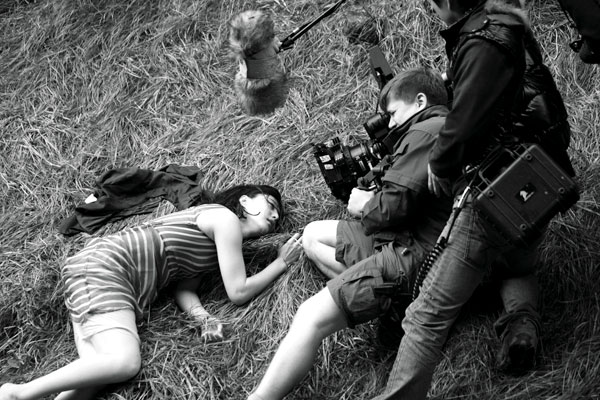

 |
|
Florian J.E. Zinke works with A-list Chinese actress Fan Bingbing in director Li Yu's latest film, Double Xposure. Photos Provided to China Daily |
 |
|
Zinke at his own studio in Beijing. |
More aspiring filmmakers are flocking to China to study at the Beijing Film Academy and to be involved in the country's booming film industry. They tell Liu Wei about their ups and downs.
One lesson that left a deep impression on 34-year-old German cinematographer Florian J.E. Zinke when he was at the Beijing Film Academy (BFA) was the one given by his lecturer, director Zhan Xiangchi.
The class had centered on the senior director's own film, Genghis Khan, made in 1986. While giving an analysis of the film, Zhan told the class that one scene involved some 20,000 extras and 6,000 horses.
That number shocked Zinke because there are only about 26,000 residents in the city he was born in.
"It feels like the whole city was in your face," jokes Zinke, who came to Beijing in 2004 to study at the BFA and has stayed on since.
Zinke is one of 1,500 international students BFA has recruited since 1988 to promote cultural exchange. The college was recently ranked as the third-best film schools in the world by Hollywood Reporter, after the American Film Institute and the film school of the University of Southern California.
It is also the largest in Asia.
Over the past decade, there has been a significant rise of international applicants, including those from Germany, Japan, South Korea and North America, thanks to the country's booming film industry.
According to Xue Liping, a staff member at the college's international school, they recruited 83 students in 2012, and the most popular majors are acting, directing and management.
What Zinke loves most about the school is having the opportunity to sit down with real directors, such as Zhan, who had handled real problems, such as controlling 26,000 people and horses at a time when computer-generated visual effects were not available.
Ifu Chen, who grew up in Canada and is currently a student in the advertising department of BFA, cannot agree more.
He has already worked in many films as an intern, having been given introductions by his seniors at the academy.
"It is a tradition in BFA for students to help each other. Our assignments, usually a short film or a commercial, involve teamwork and we work with friends from different departments," says Chen. "It is the most enjoyable part of my studies in BFA."
Chen's latest task was to take down a 6-meter-high curtain on the set of a period film, put on those made for another scene, and change the old ones back after filming was finished.
He also learned how to make fake bombs by painting Christmas baubles black.
The experience may be nothing to shout about, but 20-year-old Chen believes it is the start of something bright.
"The Chinese film industry grows really, really fast. There must be some place for people like me, who know about the West and have working experiences here," he says.
Chen is half right.
The future in China may be bright, but the journey forward may not be easy.
Zinke recalls the struggles during his initial years in China. He even had to borrow money from his father to pay rent.
And the Chinese working style is so flexible that sometimes, it drives him crazy.
"If you want to shoot on the busiest street in Berlin, there is an office in charge of it. You call it and that single call answers all questions," he says.
"But in China, first of all, you don't know who to call. You make 1,000 calls, but probably even after you have started filming on the street, someone would suddenly show up and say you cannot shoot there. The producer has to make another 1,000 calls."
But the booming film industry in China also means there is endless opportunity.
"What I see in the Chinese film industry is growing power and an emerging big market, which provides profound possibilities and opportunities for young workers," Zinke says.
Yukihiko Goto, a 32-year-old former employee at a Japanese TV station who came to China in 2004 and majored in directing, says he decided to stay after graduation because "in China, a directing graduate from BFA can work as an assistant director".
If he had gone back to Japan, he would have to start as an apprentice, followed by becoming fourth assistant director, and it will take years before he can upgrade to assistant director.
But as an assistant director in China, he has so far only been given work related to Japan or those starring Japanese actors.
Often, his job is just as an interpreter and coordinator. But he is not giving up on his dream of directing his own film.
He knows very well that to be a director, he has to write a good script first.
To do that, during his freshman year, he visited small towns in Japan and rural China, did interviews and completed a story about a Japanese middle-aged fisherman and his Chinese bride.
But to get financial backing for a film in China, especially one related to Japan, remains a huge challenge, especially as you consider the current shifts in relationship between the two countries.
The biggest takeaway the three guys obtained from BFA is not the diploma but a deeper understanding of China's film industry and the people involved.
"The diploma may work as conversation starter, but in this industry you speak with your work, never a piece of paper," says Zinke, who has his own studio and worked as a photographer and cinematographer, which his father is not too happy about.
He also managed to work in director Li Yu's latest film Double Xposure, one of the most popular films in October, which grossed 100 million yuan ($14.7 million) but was filmed with a budget of only 40 million yuan.
"Maybe I should tell him (my father) how much I earned and learned," he says.
Contact the writer at [email protected].